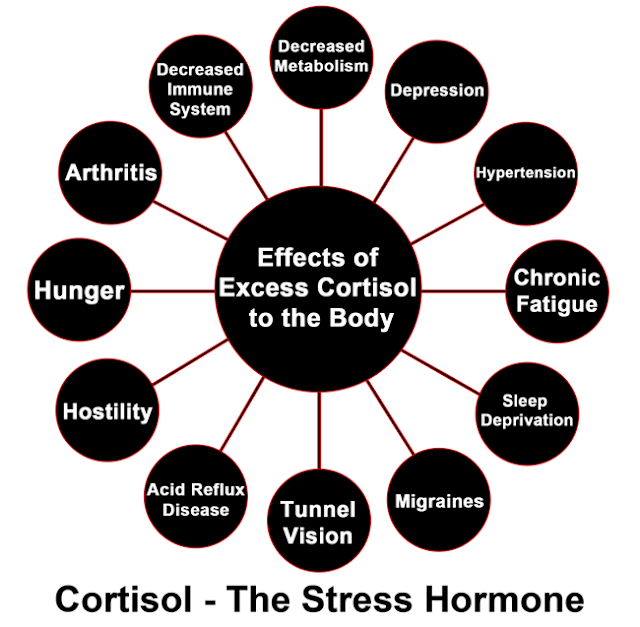OBJECTIVES OF THE DISCUSSION: By the end of this discussion, the reader/medical student will be able to;
1. Describe cortisol and it's role in generation of stress situations
INTRODUCTION:
In our discussion here,
we will use cortisol as a representative of the group of hormones
called glucocorticoids, because it is responsible for most of the
actions of this group. Cortisol increases the use of fats and excess
amino acids, in a metabolic pathway known as, gluconeogenesis for
energy and decreases the use of glucose. This is called the
glucose-sparing effect, and it is important because it conserves
glucose for use by the brain.
SECRETION OF CORTISOL: Cortisol is secreted in any type of physiological stress situation including but no limited to; disease, physical injury, hemorrhage, fear or anger, exercise, and hunger. Although most body cells easily use fatty acids and excess amino acids in cell respiration, brain cells do not, so they must have glucose. By enabling other cells to use the alternative energy sources, cortisol ensures that whatever glucose is present will be available to the brain.
Cortisol also has an anti-inflammatory effect. During
inflammation, histamine from damaged tissues makes capillaries more
permeable, and the lysosomes of damaged cells release their enzymes,
which help break down damaged tissue but may also cause destruction
of nearby healthy tissue. Cortisol blocks the effects of histamine
and stabilizes lysosomal membranes, preventing excessive tissue
destruction. Inflammation is a beneficial process up to a point, and
is an essential first step if tissue repair is to take place. It may,
however, become a vicious cycle of damage, inflammation, more damage,
more inflammation, and so on in a positive feedback mechanism. Normal
cortisol secretion seems to be the brake, to limit the inflammation
process to what is useful for tissue repair, and to prevent excessive
tissue destruction.
ADVERSE EFFECTS OF CORTISOL: Too much cortisol decreases the immune response, leaving the body susceptible to infection and significantly slowing the healing of damaged tissue. The direct stimulus for cortisol secretion is ACTH from the anterior pituitary gland, which in turn is stimulated by corticotropin releasing hormone (CRH) from the hypothalamus. CRH is produced in the physiological stress situations mentioned earlier. Although we often think of epinephrine as a hormone important in stress, cortisol is also important.
RELATED;
3. METABOLISM AND METABOLIC DISORDERS
5. BIOCHEMISTRY













No comments:
Post a Comment